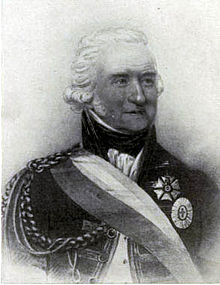John Forbes (general in the Portuguese service)
| John Forbes | |
|---|---|

John Forbes in Portuguese Army uniform
|
|
| Born | 1733 Aberdeenshire, Kingdom of Great Britain |
| Died |
8 April 1808 (aged 75) Rio de Janeiro, Portuguese colony of Brazil |
| Allegiance |
|
| Years of service | 1748-1808 |
| Rank | General |
| Battles/wars |
Seven Years' War War of the Pyrenees |
John Forbes, also known in Portuguese as João Forbes (1733–1808), of Skelater, usually known as Forbes-Skelater, was a Scottish general in the Portuguese service.
Forbes was the only son of Patrick Forbes of Skelater in Aberdeenshire, a branch of the Forbes of Corse. He entered the army when a boy of fifteen as a volunteer at the siege of Maestricht, and was successful in winning a commission. He was essentially a soldier of fortune, and when Portugal applied to Britain for officers to reorganise her army under the Count of Lippe Buckeburg, he was one of the first to volunteer.
Forbes remained in Portugal after the termination of the Seven Years' War; as a Roman Catholic who had married a Portuguese lady, he had no difficulty in getting employment. He acted for many years as adjutant-general of the Portuguese army, but at last, in 1789, he was asked to resign, the object of some jealousy of the Portuguese officers, and was made a knight of the order of Aviz, and promoted to the rank of general.
When Portugal decided to join the French Revolutionary Wars, a corps was sent to assist the Spanish army in the War of the Pyrenees, under the command of Forbes. The Portuguese soldiers behaved well, but the commanders of the Spanish army were always at variance, and Forbes himself had much trouble with his adjutant-general, Gomes Freire de Andrade. The French republicans defeated the combined Spanish-Portuguese army, and Forbes returned to Portugal with his corps. He was too old to seek further active service, so he went to Brazil with Queen Mary I, the prince regent, and the court when they fled from the forces led by Jean-Andoche Junot, and on arrival there he was appointed governor of Rio de Janeiro. He died there on 8 April 1808.
...
Wikipedia
